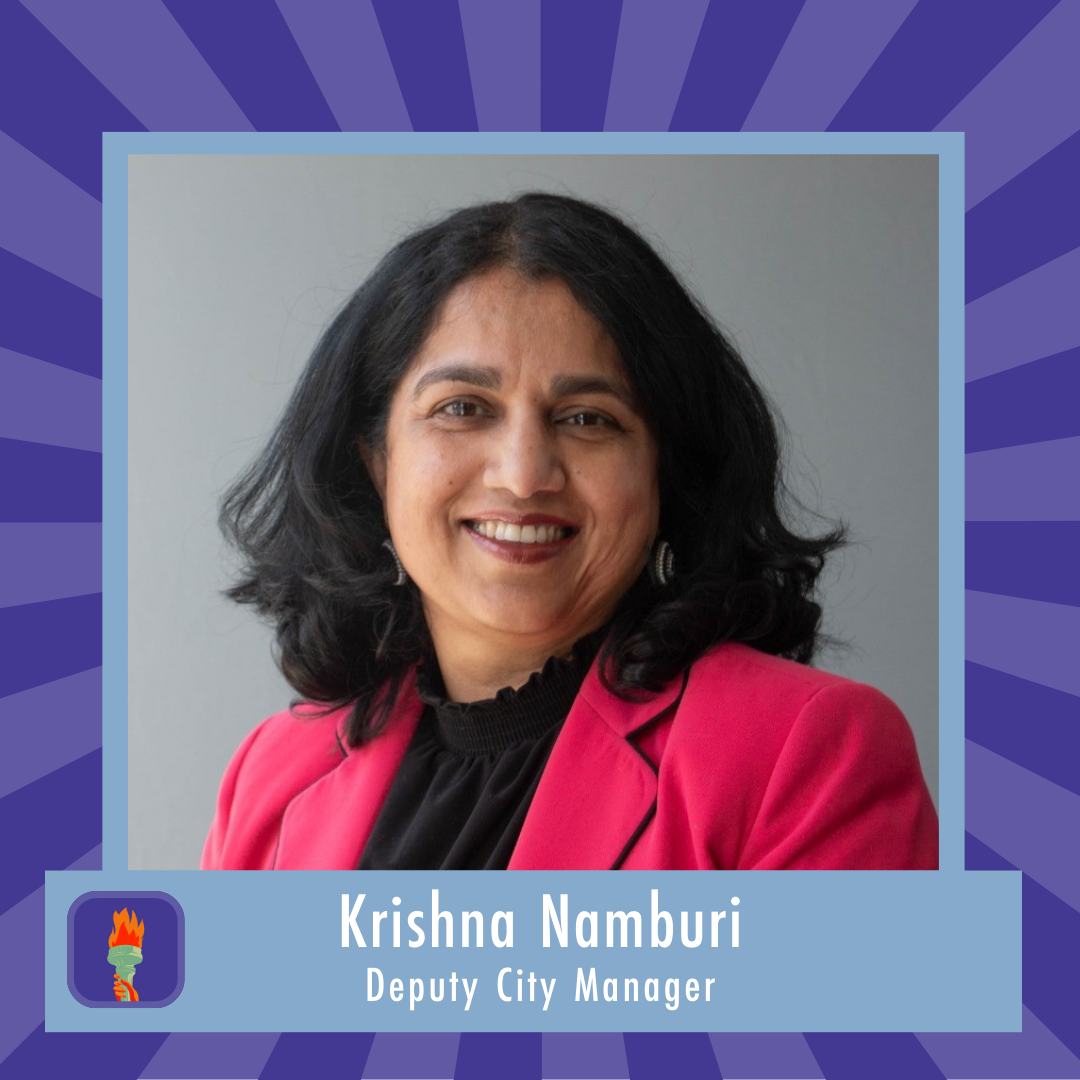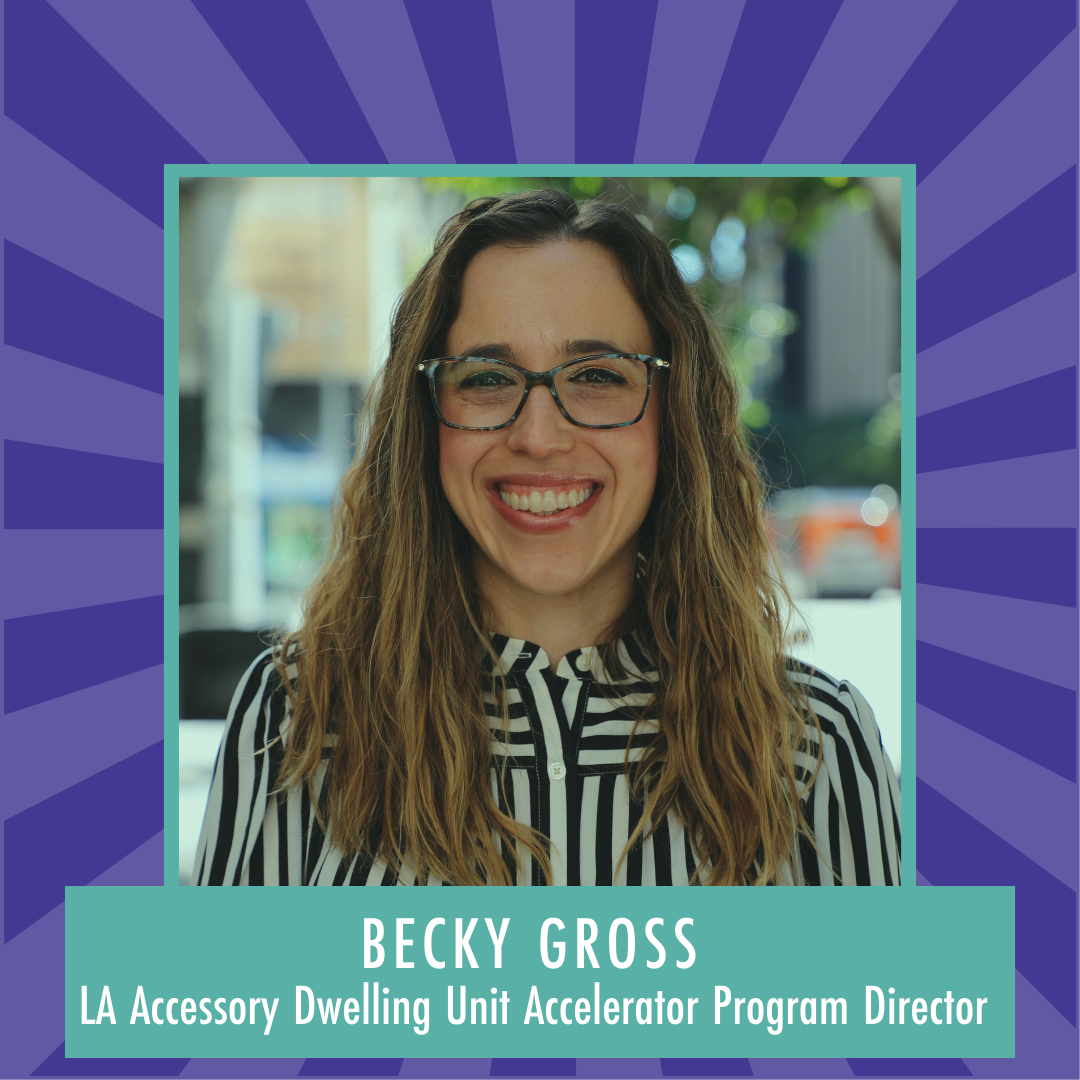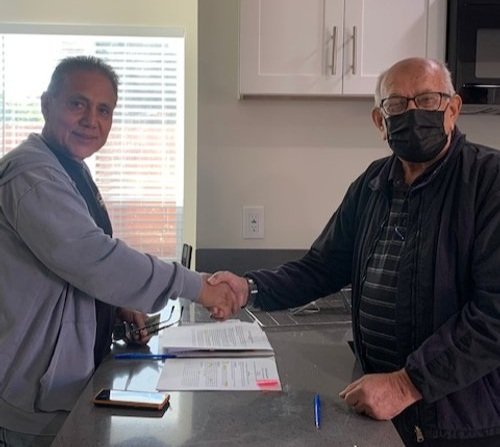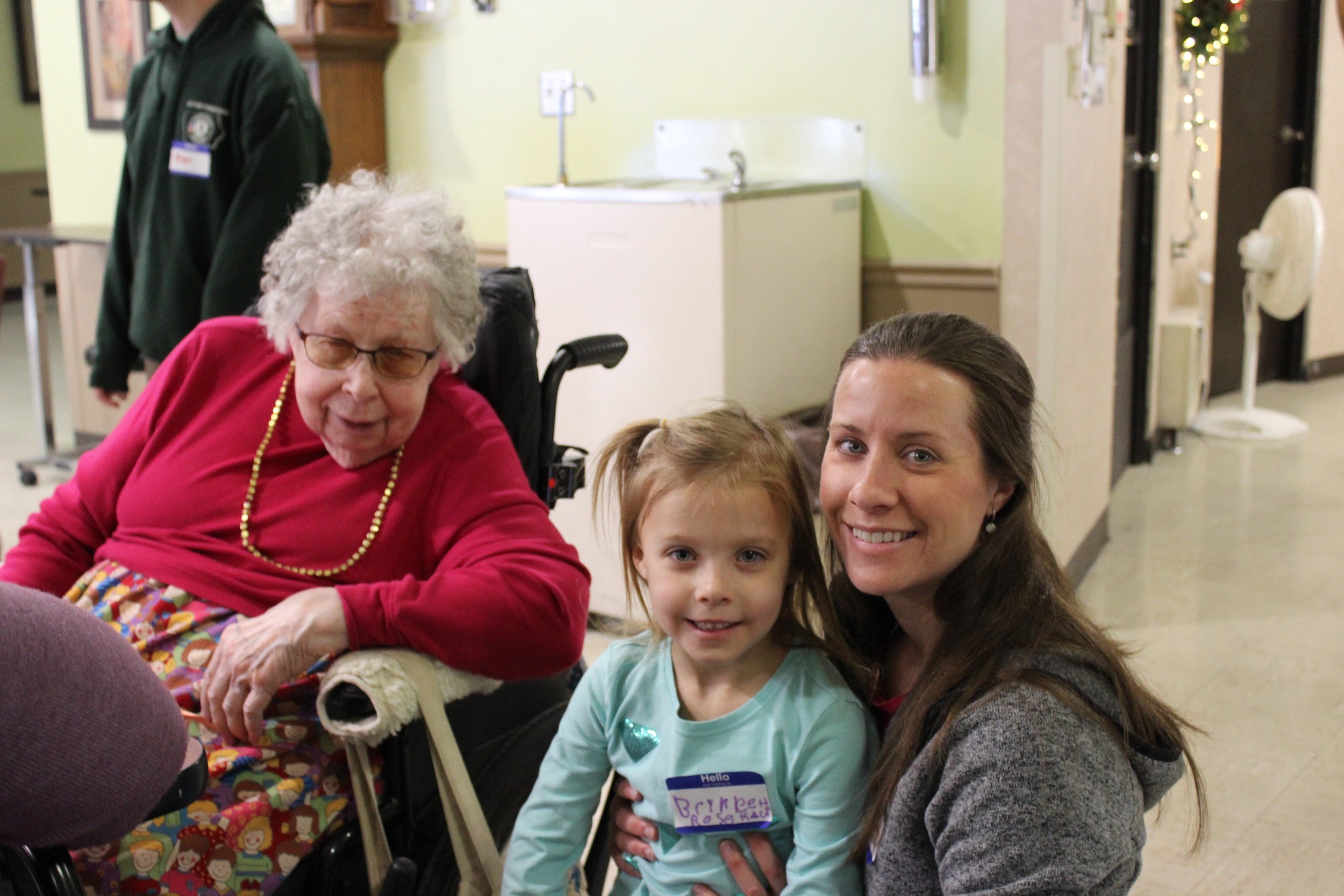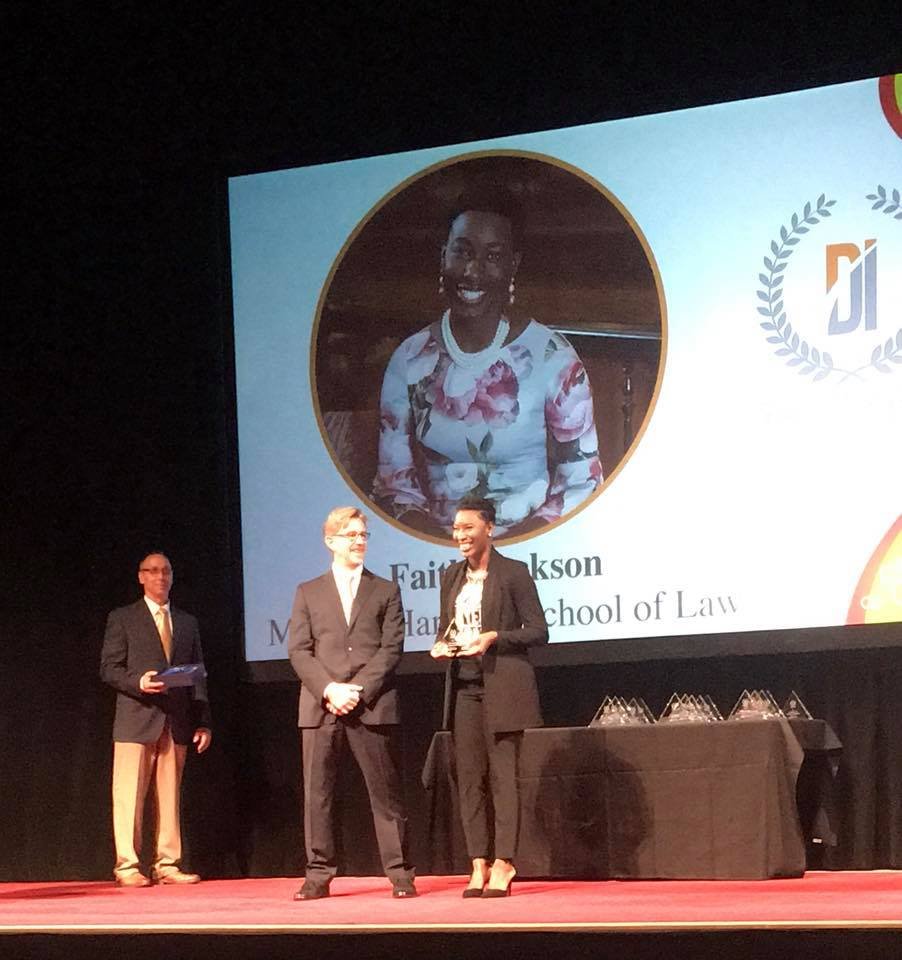Megan Bolton Addresses Homelessness Through Data and Equity
Safiya Merchant Wants Every Detroit Resident to Feel a Sense of Home
The stories the bureaucracy can’t see: Faith Kidder speaks on the importance of contextual care
By Hannah Sweet
For Ashley Schmidt, accessibility in local government is personal
Chaquinta Fisher sees big opportunities in local government tech
Jaqui Guzmán stands with community against hate and bigotry
Herocrats Spotlight: Becky Gross is taking on the housing crisis and supporting older adults with creative community-centered solutions
Becky Gross is the LA Accessory Dwelling Unit (ADU) Accelerator Program Director at the City of Los Angeles. We spoke to her about LA’s new program that connects low-income older adults who are at risk of being displaced from their neighborhood with homeowners who have ADUs, or backyard homes. She shared how courage and creativity is helping her address the City’s housing crisis and homelessness.
“I am on the Innovation Team in the Mayor’s Office and I run the LA ADU Accelerator Program. The purpose of this program is to provide affordable housing for low-income older adults by partnering with homeowners who have ADUs.
We were awarded a Bloomberg Philanthropies’ Mayors Challenge grant in 2018 to address a pressing issue in our city. At that time, we knew we wanted to do something around homelessness and the housing crisis in LA, but the concept was a little bit nebulous.
When we were designing this program, we saw an increasing trend of homeowners building ADUs in our City. ADUs comprised 22% of all the new housing production, which was staggering. Since this housing typology can be added to a lot with a single-family home, they can increase the housing density without drastically changing the character of the neighborhood. At the same time, data showed that gentrification and rising rents were displacing low-income older adults who were living on a fixed income, resulting in an increasing number falling into homelessness for the first time.
Tenant and homeowner at lease signing
We analyzed these trends and saw an opportunity to create a program that assists older adults who were at risk of becoming homeless. We engaged residents and subject-matter experts to identify older Angelenos' unique challenges, and used these insights to design a program that is holistic and responsive to their needs, while also incentivizing homeowners to partner in this effort. Participating tenants pay 30% of their income in rent, ensuring they do not have to sacrifice other essential items — such as food or medicine — to afford housing. ADUs are an ideal housing type for older adults, as they offer private but non-isolating living spaces and are often near public transit. The goal of this pilot program is to provide immediate interim housing for older adults while they wait for permanent housing placements. By providing housing in ADUs and supportive wraparound services, the program prevents older adults from falling into homelessness.
As is the nature of a pilot program, the ADU program was new for the city. Departments were hesitant to take it on at first because innovation can be risky, and it was counter to their ‘business as usual’ approach. It took time to get buy-in internally to test this concept. But this program was something that I deeply believed in. Hearing from older adults who had to make the choice between paying rent that month or purchasing their prescription and groceries was heartbreaking. It made me feel like our system was broken. I was committed getting creative and pushing boundaries to figure out a housing solution that would serve this community.
When we first were developing this program, I heard ‘no’ frequently. But it just reignited my fire even more. A ‘no’ is just a redirection. It’s not the end of the story. After each ‘no’ I heard, I continued to tweak the program until our partners were supportive of the concept. It made our idea even stronger and more effective than we could have imagined.
Carrying in groceries!
One of the things that inspires me the most about this program is the connection that our homeowners and tenants have made with each other. We started moving our first tenants into their new homes at the height of the pandemic, and we were concerned how people would feel about their health and safety. Luckily, homeowners were welcoming to their new tenants. I've heard from some homeowners and tenants that they consider each other as family. Homeowners have their tenant over for dinner, they have Thanksgiving meals together, and help with small chores like carrying groceries. They’re building a real bond. Those stories inspire me to continue this work and gives me hope that our community is wanting and willing to be part of the solution.
So far, we have placed 32 seniors with homeowners and we’re making the pilot program permanent so we can help more older adults. The program has transitioned over to the City’s Housing Department so it can persist there. We're working on ways to scale it and share out our lessons learned so we can support other jurisdictions who are interested in creating similar programs. I’m excited about this because ADUs are a growing trend, not only here in California but also across the country. I believe that if used effectively, ADUs can be part of the solution to the housing crisis in a myriad of ways.”
Herocrats Spotlight: April Bril shines light on the value of walking and biking
April Bril has been a Safe Routes to School (SRTS) Coordinator for the Upper Explorerland Regional Planning Commission in northeast Iowa for over six years, and we spoke with her about the value of walking and biking youth programs in community building:
“I help encourage active living and active transportation through coordinating walking and biking school buses, organizing walking and biking family events, and teaching bike safety.
A mom told me that her son, who is taking part of a walking school bus, is now advocating that his family walks when they go places around town. He’ll say ‘We don’t need to drive there, we can walk!’ It’s great that he’s learning from his daily habit of walking to school and encouraging his family to walk more.
Beyond the environmental and physical health benefits, being able to walk and bike places as a child gives you a sense of independence and responsibility. The mental benefits of being outside and being able to go somewhere on your own or with your friends gives you a boost to your self-esteem and pride in the accomplishment. A sense of ‘I don't need a vehicle to go somewhere. I can do it on my own!’ That is a neat feeling for a kid.
Photo of April presenting at a bike event
I feel very lucky to have my position, but I really wish we had more people who did this work locally. Because I am regionally focused, I oversee almost all of northeast Iowa. It would be wonderful for every city to have a walking and biking coordinator because these programs are better run when we find local partners that are able to be on the ground in their community. We could get a lot more done if we had more paid positions.
This work can be a little undervalued. Driving can just be easier than walking or biking somewhere. People understand that there are benefits of active transportation, but they’re not always seen or prioritized.
To get communities to prioritize walking and biking, this calls for some creativity. Once, I partnered with a high school volunteer club to coordinate a Serve and Sled event. We went sledding with elementary kids and then we walked to a nursing home to visit with the residents. Police officers also came out to sled with the students and escort our group to the nursing home. It was so fun, because there were people from all different generations building relationships and working on a community service project together. It’s rewarding to facilitate those connections and contribute to community building.”
Photo from Serve and Sled event
Herocrats Spotlight: Faith Jackson is Fearlessly Strategic about Racial Equity
When Faith Jackson began working for the City of Bloomington in Minnesota three years ago, she was thrilled to break new ground as the City’s first racial equity coordinator. Faith previously worked in racial equity and inclusion for the Cities of Minneapolis and Saint Paul, but her dedication to social justice started long before then:
“I am a very proud daughter of Mississippi, and I grew up learning at the feet of elders. I always say that. My parents advocated for themselves and others while I was in the womb, so I feel like I was born into it.”
Faith grew up in a racially hostile environment in Mississippi. When she was young, her family moved into a white neighborhood for her father to meet the residency requirement for a county job. They were the only Black family in their neighborhood, and she and her brother were the only Black students at their elementary school. There, Faith’s family experienced racism and discrimination:
“No one wanted us to stay. We had the Klan members burn crosses in our yard. We would make copies of all our homework assignments so that we could track at the end of the year what our grades should actually be. And all we needed to do was cross over the train tracks, and I would have had an entirely different experience.”
Faith interning at the City of Minneapolis Department of Civil Rights. Pictured with Velma Korbel, the former Civil Rights Director.
Being required to navigate racism at a young age shaped Faith’s perspective of her world. Growing up, she knew she wanted to help improve other people’s lives. This motivated her to work in government. Faith attended Tougaloo College in Jackson, Mississippi, “the cradle of the civil rights movement.” After receiving her bachelor’s degree, she moved to Minnesota to attend Hamline University School of Law.
Throughout law school, she interned at the City of Minneapolis Civil Rights Department and discovered a passion for policy work. After graduating, Faith was offered a full-time job in the Civil Rights Department. Within a week, she went from an intern to the newest member of their leadership team.
Faith accepting an award from Minnesota Lawyer
Faith worked for the City of Minneapolis for several years before taking her experience to St. Paul and, ultimately, Bloomington. In the fall of 2019, she was hired to build the blueprint for embedding equity and inclusion throughout the organization’s fabric.
Very quickly, Faith faced unprecedented challenges that required courage. After George Floyd’s murder in neighboring Minneapolis, Faith was put in a position where she had to be a mediator between the City of Bloomington and the community. Growing up as an activist, she felt conflicted being on the other side of the table, and she thought a lot about the City’s strategies to progress racial equity and what they wanted to accomplish.
“I made it through those moments by remembering why I chose to work in government in the first place. I reminded myself of the need and ability to influence change from within the system. I promised them that I would use my position in local government to hold the City accountable to its commitment to racial equity. I asked them to hold me accountable to that promise.”
It takes courage to disrupt systems, and Faith is leading racial equity work in government fearlessly. It can be scary to make big decisions in unprecedented times without best practices or a blueprint to rely on; to help, she leans on her professional and academic achievements, as well as her personal experiences of growing up as a Black woman and a descendant of the civil rights movement. Faith’s bravery, connection to the community, and strong sense of self help her know the right thing to do in each new situation.
Faith participating in an event with the City of Minneapolis Department of Civil Rights

